Adept Class
In an age where magic is all but forgotten except as a plot element in children’s stories, the actual practicing magic user is rare indeed. So rare as to be virtually non existent! The handful of individuals who are aware of real magic, are mostly self taught and struggle to increase their knowledge and power of their Arcane studies.
Magic, REAL Magic, is rare, very, very rare. And it is but a shadow of what it once was in the world. Those who practice what is left shun terms like ‘Magician’ or ‘Illusionist’ and such because they are associated with the pretend stage magic that entertains the public. And titles like ‘Wizard’ or ‘Sorcerer’ both because the terms are ‘loaded’ and can draw unwanted attention, and because they know that their current level of knowledge and power hardly qualifies them to use such exalted titles. So most modern day practitioners consider themselves, and refer to themselves, as ‘Adepts.’
Arcane Adepts (Magic User)
Arcane Magic, (as opposed to the powers displayed by Mystics,) involves the Adept using a portion of his own Life Force or energy to capture and bend to his will a fragment of the arcane power that flows and ebbs all across the world. The Adept’s skill, strength of will and intelligence temporarily harnesses and directs the energies by way of the formula and ritual that the Adept has learned and memorized. The energy or Life Force expended by the Adept is (usually) replenished by food and rest (Sleeping, no casting or studying.)
Adepts are self taught, or in rare instances a student of another Adept. They have, through much study, learned the Principals of Magic. This is a basic understanding of Arcane Magic and how to harness its power. As the Adept continues his/her studies he learns to Read Magic and becomes familiar enough with the ‘feel’ of magic to recognize it by Touch. (Detect Magic Touch) Eventually the Adept’s skill and awareness becomes such that he is able to craft and Attune a Wand (Rod or Staff) to his/her needs and personality.
An Adept MUST HAVE an Attuned Wand to cast ANY spell EXCEPT Read Magic and Detect Magic Touch (although Touch may be done through the wand.)
Weapon Proficiency by Character Class
| Class | Initial Number | Non-Proficient Penalty | Added Weapon Proficiency Per Level |
| Adept | 2 | -5 | 1/5 |
| Available Weapon Proficiency’s for Adepts |
|
| Firearms: Pistol | Light Club/Baton |
| Firearms: Long gun | Staff |
| Swordsmanship | Crossbow |
| Fencing | Archery |
| Knife | Brawling |
| Knife Throwing | |
Spell Craft
Spell Craft is an Ability of Adepts. It is the ability to organize the concepts of magic and assemble, in the Adept’s mind, the words, symbols and conceptualize the actual act of casting. It is the Ability which allows them to actually learn and cast spells. And it is used in comprehending the research for new spells, recognizing a spell someone else is casting and understanding someone else’s spell book. SEE: LEARNING NEW ADEPT SPELLS for more details on this.
It is ALSO employed if an Adept uses a Scroll to cast a spell that is of higher level then he/she can normally cast.
The Spell Craft check is: DC 20 + the level of the spell – Adept’s IN
EXAMPLE: An Adept with 16 Intelligence casting, or attempting to comprehend, a 3rd level spell has a DC of 20+3-16= 7
Reading Magic
Read Magic IS NOT A SPELL for an Adept that requires daily Memorization. It is a ABILITY that comes with their class. BUT it does require an ABILITY Check EACH TIME the Adept attempts to use it. If the Ability Check fails the Adept may not attempt to read THAT PARTICULAR document (book, scroll, etc) until he goes up a level. At that point the Adept may try again.
Go to the page READI NG MAGIC for more details.
Sensing Magic
The Detect Magic cantrip, for Adepts is primarily for ranged detection. An Adept’s training and ability allows an innate Detect Magic TOUCH. Essentially the ability to feel the magic inherent in something. This is a sensation or feeling. It is not the ability to analyze the type or strength of the magic, but only to feel its presence.
The Touch requires the object to be picked up, held or otherwise handled. For a large object, ex: a statue, the Adept must press his hand or hands firmly against the object. In any case the contact must be maintained for at least half a minute. It is possible to employ the Touch through the Adept’s Wand but contact must still be maintained for half a minute.
This ability does not require Memorization BUT it does require a Spell Craft Check. A failure means that no magic was noted. Repeated attempts will not be effective until the Adept goes up a level at which point he/she may try again. In this case there is no Spell Level to factor in. It is DC – Int. Example: DC 20 – 16 (Int) = 4
Wands are an ESSENTIAL MATERIAL COMPONENT FOR ALL ADEPT SPELLS
The Wand is the Adept’s focus and it replaces many (but not all) material components in spells and the somatic component (finger movements) are replaced with wand gestures. An Attuned Wand extends the Adept’s Touch for delivering touch spells. Including the Adept’s Detect Magic Touch and attack spells that involve touch. See WANDS for details,
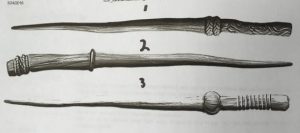
A First level Adept begins play with an Attuned Wand.
Recovering Spells
After casting some, or all, of his/her spells, an Adept must rest and study his spell book to recover spells or memorize different spells.
An Adept MUST rest, prior to memorizing, at LEAST 1 hour per level of the HIGHEST spell level that they are seeking to recover/memorize, If the Adept is trying to recover 1st level spells, it will require one hour rest prior to memorizing. If he/she is looking to recover 3rd level spells, the Adept will need three hours rest. However, the Adept will ALSO recover 1st and 2nd level spell energy. A 9th level spell takes nine hours rest, but in so doing all other spell slots are energized. Cantrips require 1 hour of rest to recharge.
Memorizing Spells
After resting, the Adept may set about memorizing spells. The Adept must spend 1 turn, (10 minutes) reading and studying, for EACH level of spell the Adept seeks to memorize. A Fifth level Adept, looking to memorize three 1st, three 2nd and two 3rd level spells is looking to memorize 15 spell levels. This will require fifteen turns, or two and a half hours studying. Study time may be reduced by 1 minute for each point of Intelligence the Adept has. So an Adept with 15 Intelligence can reduce the two and a half hours by fifteen minutes. Zero level Cantrips DO NOT require any time to study. Spells that the Adept memorized on a previous day but did not cast, are retained and do not need to be restudied, unless the Adept wishes to exchange the spell for a different spell.
NOTE: Adepts with high intelligence receive Bonus Spells. See the table below. These are considered normal spell slots for memorization purposes.
Adepts begin their comprehension of Magic by learning Cantrips. Every Adept has some cantrips burned into their memory from the long, long hours spent struggling to master the art. Though the Adept has a set number of Cantrips that can be cast before needing to rest to recover them, the Adept can cast ANY of the cantrips that he/she knows without needing to memorize particular ones ahead of time.
Spell Books. (This differs from the rules in the Unearthed Arcana.)
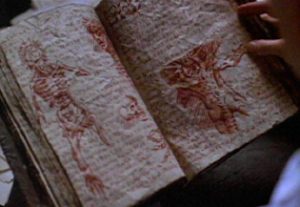
Adepts MUST memorize their spells from their spell books. There are two types of spell books that a caster can have.
A Personal Grimoire, which is the big thick volume filled with just about every bit of magical lore that the caster has accumulated about the spells contained in it. Typically these books are 12” wide, 18” long and start at 1” up to a maximum 12” thick. They are made to be expandable by adding pages (up to a maximum of 1500+/- pages.) A ‘starter’ grimoire of a 1st level spell caster typically has about 100 pages in it and is 1 inch thick.
Or a Traveler’s Book, which is essentially the crib notes a caster needs to refresh his or her mind to re-memorize for casting purposes. They are thinner, lighter, less prone to damage and contain far less information. A typical Traveler’s Spell Book is 9” wide 12” long and 3” to 6” thick. They usually start with 100 pages and, like a grimoire, pages can be added, up to 500
For descriptions, costs, capacity… See Occult and Magic Supplies.
Casting a Spell
Each time the Adept casts a spell the player makes a Concentration Roll. If the roll is made the spell is cast. If it is a Missile Spell the Adept ALSO rolls to Hit UNLESS it is an area of effect spell or one where the description indicates otherwise. After the spell is complete the DM will (secretly) roll a Powers Check.
If the Concentration Roll failed the Adept suffers a Spell Failure and must roll a Disability Check.
Concentration Roll
Casting a spell, regardless of the level of the Adept, requires immense concentration. Should the Adept’s concentration be broken the spell fails (perhaps catastrophically.) Even in the Adept’s inner sanctum, library/study there is a slight chance of concentration being broken, in the chaos of a fight or on a bustling street, the chances are even greater!
IF the Adept is physically struck (with or without injury) DURING the period the spell is being cast, the Concentration Check AUTOMATICALLY FAILS!
If an Adept has sustained injury, for example in a previous round. AND the injury has not yet been tended to (Bound, First Aid, Magical Healing, etc) then the Adept’s Concentration Roll is reduced by 1 for EVERY HIT POINT of sustained damage.
| Concentration Check | Circumstances |
|---|---|
| 5 | Alone in Laboratory or with a trained assistant |
| 8 | Outside, no one in immediate area (Less then 50’) |
| 10 | Few people about, friends or associates (less then 30’) |
| 15 | Crowded street, bar, busy or noisy place, moving train car or ship |
| 25 | Being shot at or otherwise in danger* |
| FAIL | Actually Hit, Struck or Injured! |
* If the caster is under cover while being shot at the Adept’s Concentration Check is 23.
Roll D20 Add IQ and Adept Level, subtract Spell Level check chart.
Examples:
#1 An Adept and her friends are in an alley off a noisy, busy street in London. People are passing by on the street. The Adept decides to cast a 3rd level spell. She has an IQ of 13 and is 6th level.
The Concentration Check needed is 15 or better.
The Dice roll = 4 +13(IQ) + 6(Caster’s level) – 3(Spell Level) = 20
The Adept gets her spell off easily.
#2 Attempting to cast a 1st level Spell while crouched behind a boulder being shot at.
The Adept has an IQ of 16 and is 3rd level.
The Concentration Check needed is 23 or better.
The Dice Roll = 8 + 16(IQ) + 3(Caster’s Level) – 1(Spell Level) = 26
The Adept was able to ignore the gunfire and cast the spell!
#3 The same Adept as in example #2, attempting to cast a 1st level Spell while crouched behind a boulder being shot at AND has been wounded for 8 hit points.
The Adept has an IQ of 16 and is 3rd level.
The Concentration Check needed is 23 or better.
The Dice Roll = 10 + 16(IQ) + 3(Caster’s Level) – 1(Spell Level) = 28 – 8 = 20
The Adept loses his concentration and the spell fails!
Zero Level spells (cantrips) DO NOT require Concentration Checks.
Hitting the Target
The Adept first casts his spell and it works. IF the spell is a ranged attack or a missile spell that MUST hit a target, such as Ray of Enfeeblement, it requires a To Hit Roll to hit the target. The Adept’s Dexterity bonuses (if any) count towards the To Hit roll. The target’s AC for the purpose of this roll ignores all Physical Armor. However, Dexterity bonuses, Magical Protections and cover (if any) are included in the target’s AC. A ranged attack that has an area of effect, such as Fire Ball or Sleep DOES NOT require a To Hit roll. Some other attack spells do not require To Hit rolls.
Some spells also allow a saving throw!
Powers Check for Adepts
As discussed elsewhere, the Arcane spell caster uses, in part, the energy of his own Life Force and intellect to cast and direct a spell. But that life energy is only part of the power in a spell, and in the Great Spells it is a very small part. Where the rest of the energy comes from is a matter of some debate. Where ever it comes from, history has shown that sometimes the Arcane caster draws the attention of Something… Unpleasant. What exactly happens varies. Some Adepts have simply vanished, others have gone insane and some turn inwards becoming dark and evil, others have been attacked by unknown forces…
The use of magic, casting a spell, or using certain items, places the character at risk for a Powers Check. A Powers Check is a percentage chance equal to the level of the spell, of attracting Something. If a spell is cast for an evil or sinister purpose, or the spell is from the Necromancy school this chance is doubled. Zero level spells (cantrips) do not seem to attract any attention. Location may also influence a Powers Check. Locales that are steeped in ancient magics, used for unearthly rituals or places where Death was present on a large scale (battlefield) may well cause an increased chance of drawing attention to the Adept. As a rule of thumb, most of the spells cast by characters during the course of an adventure for defense, information gathering, or other passive effects are assumed to require the spell-level Powers checks. This roll is made by the DM, who may or may not share the result!
Adept Experience Levels
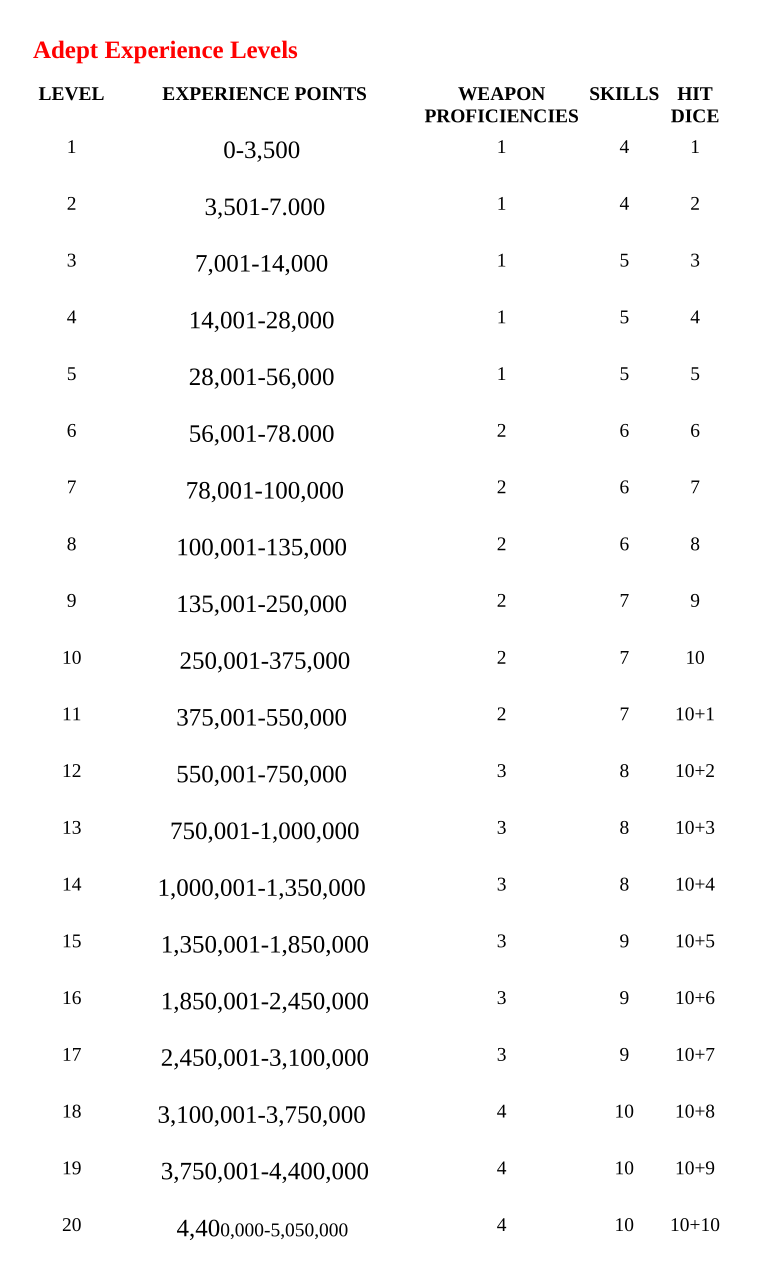
NOTE: Adepts use a D6 for hit points
A 1st level Adept STARTS with 6hp plus any Constitution bonuses if applicable.
Adept Spell Advancement
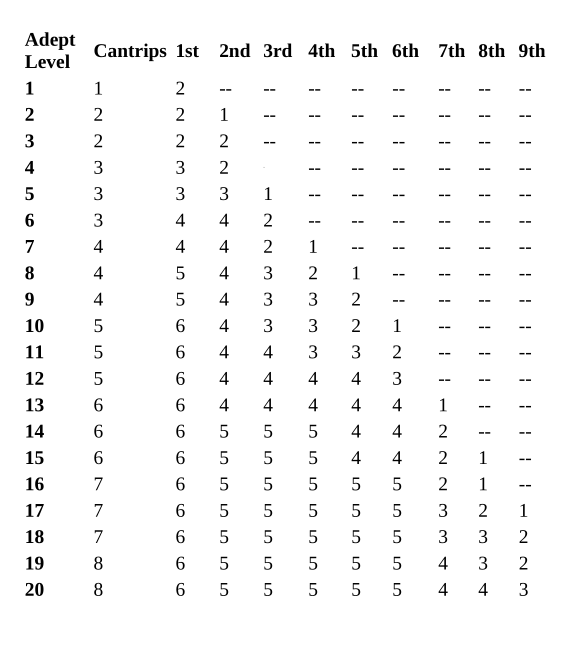
Adept’s Intelligence (IQ)
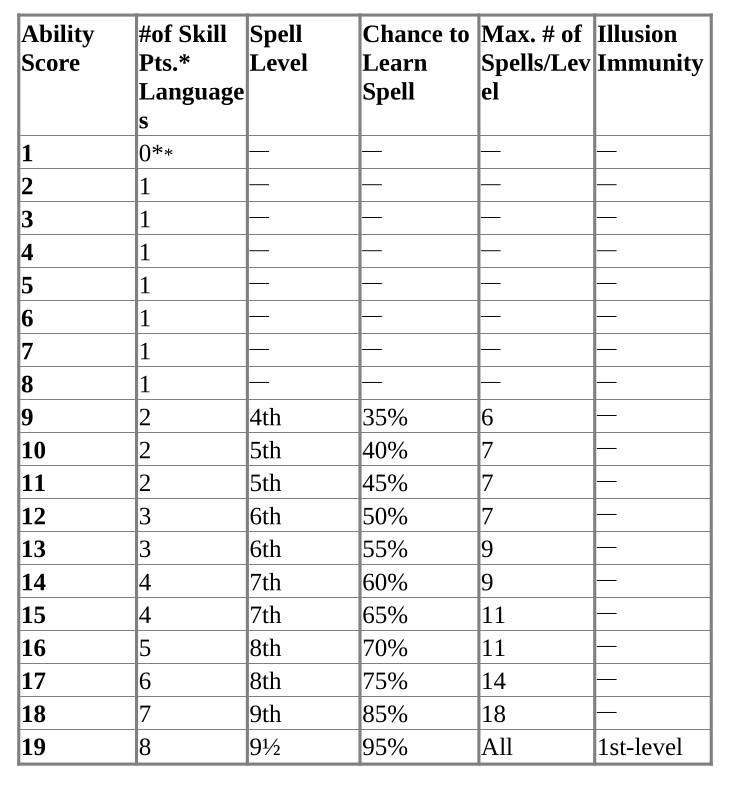
Spell Level lists the highest level of spells that can be cast by an Adept with this Intelligence.
Maximum Number of Spells per Level This number indicates the maximum number of spells a Adept can know from any particular spell level. Once a Adept has learned the maximum number of spells he is allowed in a given spell level, he cannot add any more spells of that level to his spell book. Once a spell is learned, it cannot be unlearned and replaced by a new spell.
Adepts Bonus Spells
Adepts with higher then normal Intelligence are able to memorize a few extra spells in their daily preparation ONLY if they are able to cast spells of the appropriate level.)
|
Intelligence Score |
Daily Spell Bonus |
|
9 |
None |
|
10 |
None |
|
11 |
None |
|
12 |
One Cantrip |
|
13 |
One Cantrip |
|
14 |
One Cantrip |
|
15 |
One 1st level spell |
|
16 |
One 1st level spell |
|
17 |
One 2nd level spell |
|
18 |
One 2nd level spell |
